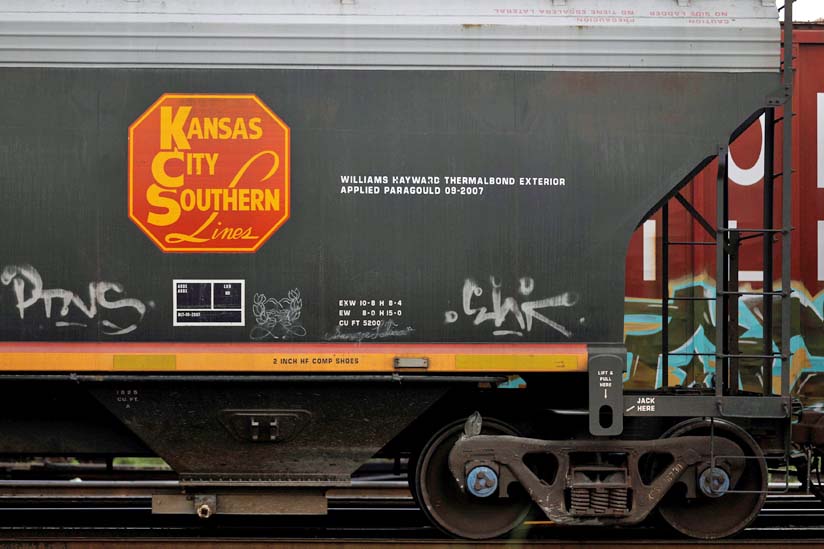
North America - Two large shareholders in CP and KCS say they will vote for the US$25.2 billion takeover by the Calgary freight
hauler.
The boards of the railways have agreed on a takeover by CP, a deal that requires majority support from the shareholders of both companies at upcoming votes, in
addition to U.S. and Mexican regulatory approval.
Richard Chilton, whose Chilton Investment Co. hedge fund owns US$172 million worth of shares in Kansas City Southern, said the deal will be good for railway
investors, customers, and the countries the proposed network will link, Canada, the United States, and Mexico.
"We have been railroad investors for a long time and we know the railroad industry very well," Mr. Chilton, who has owned KCS since 1994 and also
owns large stakes in CSX Corporation and Union Pacific Corporation, said from Stamford, Conn. "This really is a terrific combination."
Edward Molson, a senior partner at London-based Egerton Capital, which is CP's eighth-largest investor with a US$1.15 billion stake, said the deal will create
value for shareholders while fostering competition and shifting truck-borne freight to trains, a benefit to the environment.
"As a longstanding shareholder in CP, we wholeheartedly support this transaction. The prospect of CP's exceptional management team taking their unique
culture and expertise to an enlarged North American franchise will generate significant value for shareholders," Mr. Molson said.
Both railways' lists of top shareholders is dominated by large institutions, many of which declined to comment or did not respond to interview
requests.
The companies have not set dates for the shareholders votes.
The railways said in a joint filing with the Surface Transportation Board (STB), the U.S. body that rules on railway mergers, they expect to apply for a review
of the deal at the end of June.
CP has offered KCS shareholders 0.489 of a CP share and US$90 in cash for each stock.
KCS shares would be placed in a trust after a winning vote, awaiting the regulators' decisions.
The takeover would create a railway with 32,000 kilometres of track that cross Canada and run south through the middle of the United States to Mexico's Gulf
and Pacific Coasts.
The deal would create the first railway that reaches all three countries in the North American free-trade deal at a time of expected economic expansion
post-pandemic.
The railways, whose tracks meet at Kansas City, Missouri, say the merger would allow shippers of automotive goods, agricultural products, oil, and other
freight seamless service to new markets and avoid costly interchanges, including the congested hub of Chicago.
The STB will make its decision after hearing from those who would be affected by the merger, railway customers, competitors, unions, and others.
Already, some rail customers and the groups that represent them have signaled support for the deal, even as they urge the STB to study it
thoroughly.
Pleasant River Lumber Co., a CP customer that operates five plywood mills in Maine, said in a letter to the STB the merger would give it easier access to
Atlantic, Pacific, and Gulf of Mexico ports, and help the company reach new and existing buyers.
The wider network will reduce the lumber company's shipping costs and its reliance on truck while improving transit times and reliability, said Stephen
Banahan, Pleasant River's sales manager.
In Canada, groups including the Freight Management Association, Canadian Association of Petroleum Producers, and the Automotive Parts Manufacturer's
Association, have come out in favour of the deal.
"The view of the railroad customer regarding the proposed CP/KCS merger will be paramount in the regulatory review process being conducted by the
STB," said Walter Spracklin, a stock analyst at Royal Bank of Canada.
Mr. Spracklin, who publishes a yearly survey of shippers' opinions of the service provided by railways, said a large majority of those he asked support the
merger.
The STB must also approve the trust structure CP has proposed to operate the KSC independently until the regulator issues a decision on the deal, which is
expected to take more than a year.
The deal is the first proposed merger of Class 1 railroads, the largest in the United States, since 1999, when Canadian National Railway and BNSF Railway
attempted to merge.
The railways, which also touted the benefits of creating a larger, end-to-end network, called off the deal in 2000.
That's because the STB called a moratorium on big mergers amid an uproar from railway customers, who feared the deal would touch off a takeover frenzy that
would reduce competition and drive up freight prices.
Eric Atkins.
(because there was no image with original article)
(usually because it's been seen before)
provisions in Section 29 of the Canadian
Copyright Modernization Act.
